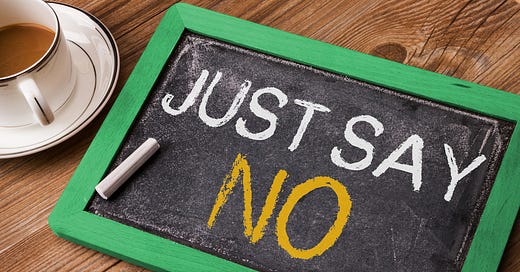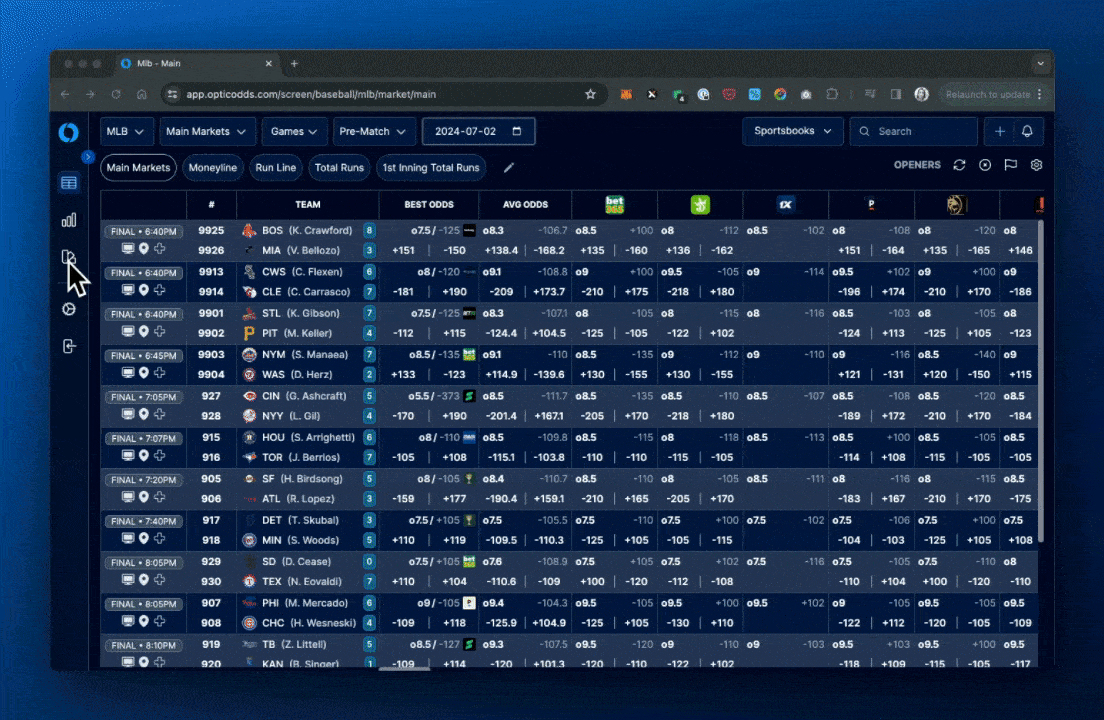Just Say No
How "No" bets fit into the sports betting ecosystem. iLotery but no instant win tickets in MA. Will the WSOP, and other tournaments, ban coaching and software?
The Bulletin Board
NEWS: ESPN dives into the “no” betting markets, including who uses them and why they exist.
QUICK HITTER: MA online lottery will likely be limited to draw games, at least to start.
VIEWS: A look at the controversial panel from last week’s NCLGS conference.
BEYOND the HEADLINE: Professional bettors launch a new non-profit called American Bettors’ Voice.
AROUND the WATERCOOLER: WSOP Main Event “shenanigans” have the poker world arguing about tournament rules.
STRAY THOUGHTS: It’s at the corner of get a map and f**k off.
SPONSOR’S MESSAGE - Sporttrade was borne out of the belief that the golden age of sports betting has yet to come. Combining proprietary technology, thoughtful design, and capital markets expertise, our platform endeavors to modernize sports betting for a more equitable, responsible, and accessible future.
Sporttrade’s newest feature, The Tape, prints all trades made on the app in real-time.
ESPN Article Highlights “No” Bets
We know why people love parlays, as they can risk a little to win a lot, but why would someone risk six figures to win a fraction of that amount?
ESPN’s David Purdum examined the “no” bets marketplace, where bettors bet on an outcome not to happen. Purdum’s column focused on the much-publicized bets from professional bettor Rufus Peabody, who bet $360,000 on Bryson Dechambeau not to win the US Open — the potential payoff was a mere $15,000. Dechambeau won the US Open, costing Peabody and Co. $360,000.
“Justifying losing $360,000 while attempting to win $15,000 to a casual bettor can be challenging and, according to Peabody, usually results in insults or even half-hearted accusations of money laundering. But more often than not, high stakes, successful gamblers are behind the bets, and they swear that if the price is right, risking a lot to win a little is worth it.”
Money laundering is one explanation for these bets. But Alex Kane, the CEO of Sporttrade (a newsletter sponsor), backed up Peabody’s remarks, telling ESPN, “These wagers are typically from sophisticated bettors with a smaller share of the “no” bets being a mix of arbitrage or “part of a portfolio of wagers, looking to hedge or balance their overall position.”
Sporttrade would know. Not only does it book these wagers, but its new Whale Tracker feature has helped put these bets into the spotlight, as Captain Jack Andrews posted on X.
To understand how bettors are using these “no” bets, consider the story of Brock Culver.
Per ESPN, Culver bet $4,925 on Sporttrade at -6701 odds that the Diamondbacks wouldn’t win the National League West. The potential payout was $73.50. But Culver also bet on the Diamondbacks to win the West at 100-1 odds with FanDuel.
“I have it set up right now so I lose $20 if the Diamondbacks don’t win, and I win $10,000, net $5,000 if the Diamondbacks win the NL West,” Culver told ESPN.
The intriguing aspect of these bets is what happens if regulators place betting caps on customers or perform means-testing; the can’t-lose situation Culver created for himself might disappear.
Quick Hitter: MA iLottery Will Be Draw-Only… to Start
A small but significant update on Monday’s Massachusetts online lottery story.
Even though the language is extremely vague, according to Play iLottery’s Drew Ellis, while discussing the matter, Massachusetts lawmakers intimated that online lottery offerings would be limited to draw games, at least to start.
However, the vague language seems to leave additional products (like instant win games) at the discretion of the lottery:
Section 24. (a) The commission is hereby authorized to conduct a state lottery and shall 13 determine: (i) the types of lotteries to be conducted;
Further, the language around online sales says tickets and games:
(i) require age verification measures to be reasonably designed to block access to and prevent sales of lottery tickets, games or shares online, over the internet, through the use of a mobile application or through any other means to persons under the age of 21;
(ii) limit sales of lottery tickets, games or shares online, over the internet, through the use of a mobile application or through any other means to transactions initiated and received, or otherwise made, within the commonwealth;
SPONSOR’S MESSAGE - Join hundreds of operators using OpticOdds for trading, risk management, and Same Game Parlay analysis.
Real-time data and trading tools for sports betting + fantasy operators. Built by those who have done it before.
Looking to join the fastest-growing data provider in the sports betting industry? Join the team now.
NCLGS Panel Gives the Bettor’s Perspective
The National Council of Legislators from Gaming States hosted what may well have been the most controversial panel discussion in recent memory.
The panel, dubbed Making a Living Off the Odds, featured industry stalwart Richard Schuetz and two professional sports bettors, Billy Walters and Gadoon “Spanky” Kyrollos.
The controversial part is that Walters and Spanky have both been convicted of gambling-related crimes. Readers may recall that Spanky has also admitted to bearding and is accused (accused being a very important detail here) of far worse by one of those beards, attorney Steven Jacobs.
The panel prompted Legal Sports Report’s Eric Ramsey to ask, “If you’re a lawmaker in a state like Georgia or Missouri, do you *really* want to listen to a couple of gambling criminals complain about not being able to get $100k down on NFL sides anymore?”
As Ramsey said (paraphrasing), right message. Wrong messengers.
Or are they the wrong messengers?
So, what was the message? It was transparency.
“We should have transparency, and right now we don’t have transparency,” Walters said. Walters and Spanky pushed back against standard practices like limiting or banning “sharp” bettors and the lack of transparent odds.
As Spanky put it (and as I’ve argued in the past), “You walk into any casino and every table game, every slot machine [has a clear maximum bet]. The sportsbook industry does not have that — all limits are individualized, and that shouldn’t happen.”
From a newsletter earlier this month:
“The answer to card counters isn’t banning them, which turns into a costly game of cat and mouse. The answer is adjusting the rules and procedures of the game to weaken a card-counters advantage.
“That can be anything from table minimums and maximums to how often a deck is shuffled (whether it’s a single deck or how deep into a six or seven-deck shoe a dealer is) to rules like hitting on a soft 17 to switching from 3/2 to 6/5 on a blackjack.”
“If you have an operator who can’t manage his business and be profitable with transparency, with posting the limits, treating everyone equally, then he probably shouldn’t have a license,” Walters said (per Casino Reports reporting). “If you don’t have the expertise to operate a sportsbook and treat everyone fairly who’s not violating the rules, then maybe you don’t have the expertise to be a sportsbook writer.”
I would agree with most of these statements, but as I previously wrote, be careful asking for fairness:
“There are policies sportsbooks could deploy that professional bettors would dislike almost as much as being limited. The goal should be to put additional checks in place that limit a sportsbook’s exposure and reduce or eliminate the reward for violating these policies.”
The question is, do sophisticated sports bettors want the current game of cat-and-mouse, or would they prefer anti-card-counting rules?
Beyond the Headline: Spanky, Walters, and Schuetz Launch American Bettors’ Voice
Speaking of our NCLGS trio, Spanky and Billy Walters announced this week the launch of a Nevada-based non-profit called American Bettors’ Voice (ABV).
According to the press release, “The purpose of ABV is to give sports bettors a seat at the table in the rapidly expanding U.S. online sports betting markets.”
“While legislators, operators, regulators, and lobbyists have been marching along in state after state, introducing their version of sports betting, this has been done with little transparency and no consideration for creating a sustainable model. Presenting the sports bettor with a take-it-or-leave-it model without understanding what the consumer wants is a fool’s errand and will work against many of the stated goals of why betting was legalized.”
The policy points the group will focus on are:
Bet limiting and the “ban or bankrupt model.”
Developing meaningful and intelligible Terms and Conditions.
Working to harmonize Terms & Conditions within and among jurisdictions.
The asymmetry of and resolution of palpable errors.
The timely resolution of disputes.
Reducing withdrawal friction.
Protections for the vulnerable and control against player exploitation.
Disclosure through the regulatory agency of political contributions and spending on lobbying.
Schuetz is also involved in the project and serves as the CEO. Also in the mix are Brett Smiley, Brianne Doura-Schawohl, Susan Hensel, Allison McCoy, and Eric Raskin, who are on the group’s advisory board.
It will be interesting to watch the addition of another industry antagonist (this one pushing for bettor-friendly policies) during the 2025 legislative session.
SPONSOR’S MESSAGE - Underdog: the most innovative company in sports gaming.
At Underdog we use our own tech stack to create the industry’s most popular games, designing products specifically for the American sports fan.
Join us as we build the future of sports gaming.
Visit: https://underdogfantasy.com/careers
Around the Watercooler
Social media conversations, rumors, and gossip.
One of the hottest post-WSOP topics has been eventual champion Jonathan Tamayo’s use of software on the rail of the Main Event.
As Poker.org put it: “All the talk since Tamayo won $10 million and the Main Event bracelet has been around the help he was receiving on the rail from fellow pros Dominik Nitsche (who had a laptop open on the front row) and Joe McKeehen (himself a former Main Event winner), and whether this was against the rules or just the spirit of the game.”
The situation has caused uproar and endless debate as factions argue for and against the practice and propose different solutions.
However, there is an issue with such a rule, and Matt Glantz hit the nail on the head with this tweet:
Stray Thoughts
One of the most frustrating things in my line of work is trying to find what should be a simple data set and coming up empty… or, worse, with conflicting information.










